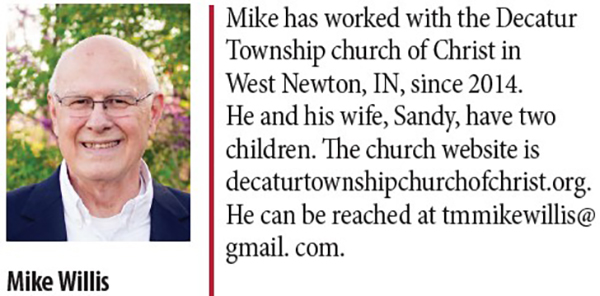
by Mike Willis
Synopsis: In Mark 13:32, regarding the day and hour of His return, Jesus said, “no one” (including “the Son”) “knows” except the Father. This article considers how He can be deity even though He claimed not to know the time of His Second Coming.
In looking at the various passages related to a study of eschatology, the end-times, some have struggled to reconcile an affirmation of the deity of Jesus with His statement that He did not know the time of His Second Coming. In His sermon on the Mount of Olives regarding the imminent destruction of the city of Jerusalem, Jesus contrasted the destruction of the city which would be preceded by visible signs of its destruction, with the destruction of the heaven and earth, which would not be preceded by visible signs of their destruction. He said:
Heaven and earth will pass away, but My words will by no means pass away. But of that day and hour no one knows, not even the angels of heaven, but My Father only (Matt. 24:35‑36).
Heaven and earth will pass away, but My words will by no means pass away. But of that day and hour no one knows, not even the angels in heaven, nor the Son, but only the Father (Mark 13:31-32).
The Matthean text states that “My Father only” knows the day and hour when the heaven and earth will pass away. In Mark’s account, the implication that Jesus does not know that day and hour is explicitly stated by the inclusion of the phrase “nor the Son.” This raises the issue of how the Son could not know the day and hour if He were deity. Isn’t it the nature of deity to know all things?
Commentaries have struggled to resolve what appears to be a contradiction. During the Arian controversy (third-fourth century AD), an influential heresy denied the deity of Jesus by maintaining that the Son of God was created by the Father and was therefore neither coeternal with the Father, nor consubstantial (of the same essence) with Him.
Those who believe that Jesus was, is, and always will be divine (i.e., He is the Alpha and Omega, Rev. 1:8, 11; 21:6, 13) approach the passage by arguing that Jesus’s lack of knowledge about the Second Coming reflected His condition during His incarnation. For example, W. J. Deane (1823-1895) explains that men are excluded from the knowledge of the day and hour, but surely not the Son. He then elaborates that, if the Son were excluded, it was limited to the period when He was incarnate.
If, then, Christ asserts that he is ignorant of anything, it must be that in his human nature he hath willed not to know that which in his divine nature he was cognizant of (Pulpit Commentary: The Gospel According to St. Matthew, 441).
E. Bickersteth (1825-1906) approached the passage in the same way in his comments on Mark 13:32.
Why, then, does St. Mark here add, “neither the Son”? The answer is surely to be found in the great truth of the hypostatic union. The eternal Son, as God, by his omniscience, and as man, by knowledge imparted to him, knows perfectly the day and the hour of the future judgment. But Christ as man, and as the Messenger from God to men, did not so know it as to be able to reveal it to men. The ambassador, if he is asked concerning the secret counsels of his sovereign, may truly answer that he knows them not so as to communicate them to others. For as an ambassador he only communicates those things which are committed to him by his sovereign to deliver, and not those things which he is bidden to keep secret (Pulpit Commentary: The Gospel According to St. Mark, 202).
The great German commentator, H. A. W. Meyer (1800-1873), explained the text in the same way:
“This reservation on the part of the Father excludes even the incarnate Son (Mark 13:32). The limitation implied in our passage as regards the human side of our Lord’s nature is to be viewed in the same light as that implied in 20:23” [more on this verse later, mw] (Meyer’s Commentary on the New Testament: Matthew, 427). Henry Alford (1810-1871) said, “in the course of humiliation undertaken by the Son, in which He increased in wisdom (Luke 2:52), learned obedience (Heb. 5:8), uttered desires in prayer (Luke 6:12, etc.)—this matter was hidden from Him” (The Greek Testament, I:245).
Kyle Pope explained the passage in much the same way, saying, “We must note that this was a statement that Jesus made while (He) was on earth. Whiteside is correct that this ‘does not prove that the glorified Christ is now ignorant of that time’ (Doctrinal Discourses, 298)” (Truth Commentaries: The Book of Matthew, 872).
Some commentators believe the statement affirms that there are some things the Father knows that are not known by the Son. Leon Morris (1914-2006) stated,
That day and hour defines the measures we use in fixing a date, but that no one knows firmly excludes the possibility of doing so. One would have thought that no one is definite enough to make clear the impossibility of all date fixing. It shuts out the whole human race from the knowledge in question. But Jesus goes further. The angels do not have this knowledge; even in heaven the knowledge is not shared. And what surprises us even more is that the Son himself did not share the secret. The only person who knows, Jesus says, is the Father only. Nothing could be more explicit (The Pillar New Testament Commentary: The Gospel according to Matthew, 613).
One should notice that the context of the statement is one of a high Christology. Jesus speaks of an ascending scale of beings: angels, the Son, and the Father. On this scale, Jesus is above the angels. The doctrine of the deity of Christ is not a late development; Jesus Himself placed Himself above the angels. He is below the Father, not in essence, but in the role which He served. Knowing when the Second Coming would occur is specifically said to be under the control of the Father. Jesus Himself said, “It is not for you to know times or seasons which the Father has put in His own authority” [emphasis, mw] (Acts 1:7).
Other passages also show that Jesus served under the will of the Father.
So He said to them, “You will indeed drink My cup, and be baptized with the baptism that I am baptized with; but to sit on My right hand and on My left is not Mine to give, but it is for those for whom it is prepared by My Father” (Matt. 20:23).
For “He has put all things under His feet.” But when He says “all things are put under Him,” it is evident that He who put all things under Him is excepted (1 Cor. 15:27).
Both passages recognize a role for the Father that is not given to the Son. I read the statements of Scripture and struggle at times to see how both concepts fit together: Jesus being omnipotent but submissive to the Father; the Holy Spirit being omnipotent but working under the direction of the Father (John 14:16, 26) and Jesus (John 15:26; 16:7, 13). I attribute my struggle to put all the pieces in place to man’s limited ability to comprehend the infinite nature of God. The passage so frequently quoted seems applicable here: “The secret things belong to the Lord our God, but those things which are revealed belong to us and to our children forever, that we may do all the words of this law” (Deut. 29:29).
The conclusion which I have reached is to teach what both passages state. Without question, the Bible affirms the deity of Jesus (John 1:1-4, 14; Ps. 45:6 [Heb. 1:8]; Isa. 7:14 [Matt. 1:23]; 9:6; Phil. 2:6; etc.) and there is no question that the Scriptures attribute to the Father some things not affirmed about the Son (Matt. 24:35-35; Mark 13:31-32; Acts 1:7; Matt. 20:23; 1 Cor. 15:27). Whether I fully understand how these things fit together is irrelevant. The entire idea of incarnation strains one’s ability to comprehend how Jesus could be fully divine and fully human, but who can deny that this is what the Bible reveals? 


